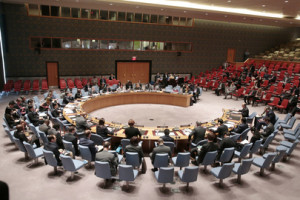Today, at 10h00 New York time, the UN Security Council voted on a draft resolution introduced by France to refer the situation in Syria to the International Criminal Court (ICC). The resolution failed to pass when Russia and China, permanent members of the Council, vetoed the resolution.
Samantha Power, US Ambassador to the UN, in her statement following the vote criticised Russia and China for impeding access to justice for the
Syrian people. She also emphasised the importance of holding Russia and China to account:
“While there may be no ICC accountability today, there should be accountability for those members of this Council that have prevented
accountability.”
The US agreed to support the resolution after ensuring that Israel would be protected from prosecution before the Court in relation to its occupation of Golan Heights in Syria. Responding to criticisms that the resolution was biased, Power said:
“I agree. [The resolution] was biased in favour of establishing facts, tilted in favour of establishing peace.”
The veto has been called an “endorsement of impunity” by the Lithuanian representative and “disgraceful” by the United Kingdom.
The result is unlikely to come as a surprise following the statement made yesterday by Vitaly Churkin, Russia’s Ambassador to the UN, who called the resolution:
“simply a publicity stunt which will have a detrimental effect, unfortunately, on our joint efforts in trying to resolve politically the crisis in Syria.”
Today’s vote marked the fourth veto of the Syrian situation in the last three years.
Since Syria is not a party to the Rome Statute of the ICC, the Court may only exercise its jurisdiction over the situation if Syria were to accept the jurisdiction of the Court by way of an Article 12(3) declaration or the Security Council were to refer the situation to it.



